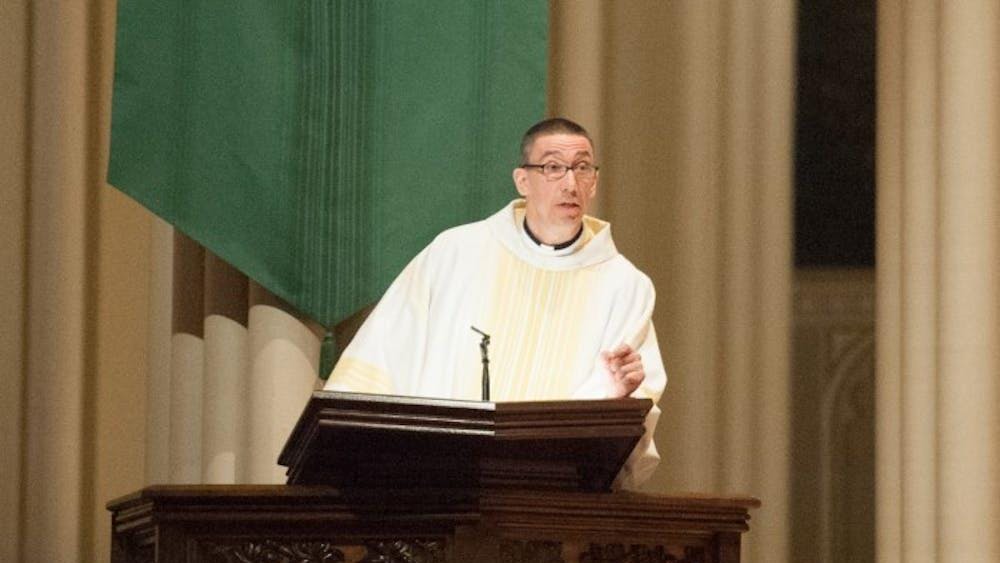Three plaintiffs from the landmark Supreme Court case Obergefell v. Hodges, which legalized same-sex marriage in the United States, shared their story in front of a full audience in the Law School’s McCartan Courtroom on Wednesday.
Jim Obergefell said the lawsuit began soon after he and his husband, John Arthur, decided to marry in 2013, when the civil rights case United States v. Windsor ruled in favor of tax breaks to same-sex married couples.
“John and I decided that for us, if we’re gonna get married, we will do it only when it carries legal weight — only when our government will say, ‘John and Jim, you exist. We see you. You matter,’” he said.
Obergefell said he was at the hospital with Arthur, who was dying of Lou Gehrig’s disease, when news of the decision broke.
“Here was this moment in time we had always hoped for,” he said. “I leaned over, hugged and kissed John, and said, ‘Let’s get married.’”
The two married that July, Obergefell said. A few days later, Al Gerhardstein, an Ohio-based civil rights attorney, reached out and asked to meet with them about pursuing a lawsuit against Ohio. He said since the state still had a constitutional amendment banning same-sex marriage, their marriage would not be recognized on Arthur’s death certificate and Obergefell would not be identified as his surviving spouse.
“As you can imagine, hearing that news broke our hearts,” Obergefell said. “But I think, more importantly, it made us angry.”
With Gerhardstein’s encouragement, the two decided to file a discrimination lawsuit against Ohio and Cincinnati.
“For us, it was simply the right thing to do,” Obergefell said. “There was no reason that our lawful marriage should be allowed to be completely disregarded by the state of Ohio — the state where we file taxes, the state where we were productive members of society.”
A mere 11 days after getting married, Obergefell and Gerhardstein appeared in court before federal judge Timothy Black to present their case.
“I got to talk to [Black] about what John meant to me — what our marriage meant to each of us,” Obergefell said.
But gaining Cincinnati’s support posed a formidable challenge, Obergefell said. In 1993, the city approved an amendment to its charter stating, “No special class status may be granted based upon sexual orientation, conduct or relationships.” The city maintained its stance against gay marriage long after, appealing the amendment in 2004 only to ban same-sex marriage later that year.
“We were known as the ‘Town Without Pity’ — the most gay-unfriendly city in the country,” Obergefell said.
To his surprise, he said, the city sided in his favor.
“The city solicitor stood up in the courtroom and said, ‘Your Honor, the city of Cincinnati agrees with John and Jim,’” Obergefell said. “‘Their marriage deserves to be recognized.’”
The court followed suit.
“At 5 [p.m.] that day, Justice Black, in a sentence that started with, ‘This is not a complicated case,’ ruled in our favor,” Obergefell said.
Arthur died three months after the ruling, Obergefell said.
“He died knowing his death certificate would be accurate,” he said. “He died knowing the most significant relationship of his life — of our lives — would exist on his last record as a person.”
Obergefell said the state of Ohio soon filed for an appeal, however. Obergefell, along with six same-sex couples, appeared before the Sixth Circuit.
“Our legal team would say … ‘Don’t hold your breath on this one. Sixth Circuit — pretty conservative,’” he said.
As expected, Obergefell said, the team lost at the Sixth Circuit, which ruled the marriage bans were constitutional. With so many conflicting rulings, however, the case culminated in a Supreme Court review with over 30 plaintiffs — including Greg Bourke and Michael DeLeon.
Bourke said he and DeLeon, residents of Louisville, originally filed their lawsuit calling for marriage recognition against the state of Kentucky. The two married in 2004 in Ontario, but were unable to share legal custody of their children because of the state’s same-sex marriage ban.
“We did it because at that time nobody else in Kentucky wanted to do it,” Bourke said. “And because we needed to do it for our children. … For 14 years, I had to think about the fact that if something happened to my husband, I would really have no legal rights to claim our children.”
Because of Kentucky’s conservative culture, however, the case fell through.
“When we filed our lawsuit, it was just not well-received,” he said.
After their loss at the district level, they decided to join as plaintiffs in the Obergefell v. Hodges case that overturned the Sixth Circuit decision, Bourke said.
“It was an absolutely beautiful moment in that courtroom, when it sunk in that we did actually win,” Obergefell said.













